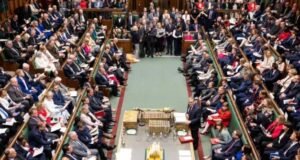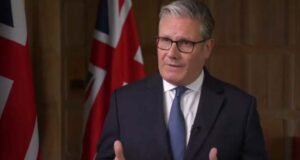EU negotiator reportedly believes speech could signal room for Brexit compromise
Michel Barnier, the EU’s chief negotiator, has taken Theresa May’s failure to namecheck Chequers in her Tory conference speech as a sign that she may be ready to dump the plan and get realistic, according to sources in Brussels.
In her speech in Birmingham, May spelled out her vision of a free trade deal but she notably did not talk of it as her “Chequers proposals”, as she has done in the past. Some Tory MPs who are campaigning for May to drop the proposal of a common rulebook on goods, in particular, have taken that as a positive sign.
David Davis’s former chief of staff in the Department for Exiting the EU, Stewart Jackson, predicted in the wake of the speech that a change of strategy would follow a cabinet meeting next Tuesday.
It is understood that Barnier took some comfort from the absence of the word “Chequers” in May’s speech, although he noted that the prime minister had once again committed the government to “frictionless trade in goods”, an outcome that the EU has said cannot come to pass given the UK’s decision to leave the single market and the customs union.
A European commission spokesman declined to comment.
One source said: “Barnier noted that Mrs May did not name Chequers in the speech, and that this might be a sign that she is getting realistic. But then she talked about frictionless trade, when previously she has spoken of making trade [as] frictionless as possible. So he could only speculate what will happen next. It seems we will know more by the middle of next week.”
A second source said: “[Barnier] believes that unless there is a decisive breakthrough in the talks on the Irish issue within the next two weeks then people need to acknowledge that a no-deal is likely. He has asked for people to calm their language as we get into this crucial phase”.
The EU plans to publish a four- or five-page political declaration on the future trade relationship next Wednesday, which will sketch out a trade deal that covers an unprecedented number of sectors. But it will not offer May any succour on the central planks of her recently published white paper, agreed by the cabinet at the prime minister’s country retreat.
The EU has rejected the suggestion that the free flow of goods can be salvaged by the UK following regulations on goods and signing up to a customs arrangement that avoids checks but allows the British government its own independent trade policy.
In the wake of the Tory conference, Barnier is also said to have privately expressed his gravest concern about the strident position of the DUP. The insistence by the DUP leader, Arlene Foster, that she will not tolerate any new checks on goods flowing between Northern Ireland and the rest of the UK was perhaps the most significant development of the conference.
The EU is insisting that in the legally enforceable backstop position to ensure that there is no hard border on the island of Ireland, Northern Ireland needs to stay in the customs territory of the bloc.
A revised EU paper on the proposal, due to be published imminently, will seek to reassure the UK that the scale and type of checks in the Irish Sea would be limited.
However, May repeated in her speech that this would represent a bad deal that “carves off Northern Ireland”. She said: “We will never break up our country. I have treated the EU with nothing but respect. The UK expects the same.”
The UK is set to publish its own paper on the backstop within days. It will suggest a temporary customs arrangement that will keep the whole of the UK in a quasi-customs union, although the British government would retain the right to sign trade deals with other countries where such a policy did not clash with the new arrangement. Northern Ireland could also stay in regulatory alignment with the EU should Stormont and the Northern Ireland executive agree.
The Irish government has always supported the idea of a customs arrangement, although it is opposed to Stormont having a veto on regulatory alignment.
Of more concern to the UK, is the opposition of the European commission, France and Germany to the customs plan, which they say is a threat to the integrity of the customs union.
An Irish official told the Financial Times: “It looks like it would resolve that issue [of the border]. Whether Europe accept it or not is another conversation.”
Philippe Lamberts, the leader of the Greens in the European parliament, said the UK needed to “square the circle”, saying: “I’m increasingly worried. We have heard from May, Raab, Johnson. But nothing has changed.”
 Weekly Bangla Mirror | Bangla Mirror, Bangladeshi news in UK, bangla mirror news
Weekly Bangla Mirror | Bangla Mirror, Bangladeshi news in UK, bangla mirror news







